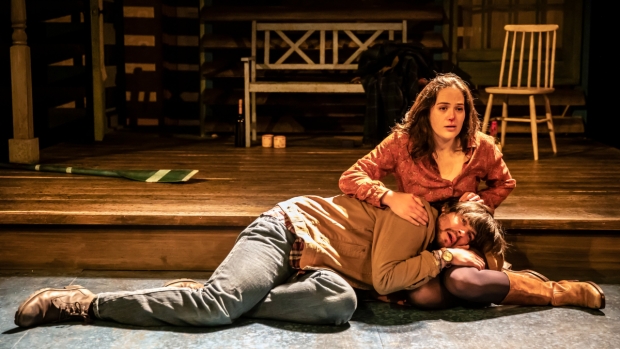David Mamet's The Woods at Southwark Playhouse – review
The new staging marks the first production of the play in 25 years

© Pamela Raith
I am beginning to think David Mamet's significance as a playwright may have been a mirage, a product of a particular time and place when his telegraphic reports from the cultural frontline looked like wisdom.
Certainly, once you peer around the sides of that terrific trio Sexual Perversity in Chicago, Glengarry Glen Ross, and American Buffalo, the fabric of his career begins to look surprisingly threadbare.
The Woods, a two-hander from 1977, is a case in point. Mamet himself banned performances at one point, and this is the first British revival for 21 years. It wouldn't have been missed if it had stayed unperformed.
This is Mamet in the raw, a summation of his vision of the archetypal relationship between men and women, all gulfs of misunderstanding and genetic predetermination. Ruth (Francesca Carpanini) and Nick (Sam Frenchum) are a young couple who have escaped the confines of the city to stay in his family's cabin in the woods.
From the first there is a tension between them. Ruth never stops talking, describing her excitement at the escape, her joy at being with Nick, her sadness at losing her grandmother's bracelets on a fishing expedition. She muses on the fact that women couldn't run away to sea, that the Vikings killed their female young. This being a Mamet play, she also broods on the nature of appetite and why people chose to love people who are bad for them.
That red flag is clearly raised over the head of Nick, who sits taciturn, his unease and barbed asides contrasting with her desire to "be still and content." He talks about his father who returned from the war, and fell down a well with a friend who claimed to have been abducted by Martians. He expresses his fear of the woods, and demands that Ruth tell him stories to cure his sleeplessness.
The mood curdles still further as consensual sex turns to forced sex and to physical violence. All the while, as we watch the battle of the sexes unfold, with her desire for love contrasted with his more naked lust, the characters talk about the forest, the lake, the earth, making them carry heavy metaphorical significance.
Their arguments are unedifying and endless. The phrase "nothing lasts forever" shoots through the text like a vein; there were points when I thought this play would. It's only 90 minutes long and takes place over a single night and the following morning, but there's a wearying circularity about it that makes it tedious, despite all the best efforts of the actors who both imbue their characters with more reality than the text suggests they deserve.
Director Russell Bolam also tries his hardest, keeping things moving along, much helped by some realistic fights staged by Haruka Kuroda. Designer Anthony Lamble provides a gently faded set, with the cabin's old wallpaper just visible through the slats of the window on the porch where the action unfolds.
But it's hard not to feel that all their care and attention would have been better lavished on a more insightful play that had rather more to say about the relationships between men and women than this stale and dated chamber piece.












